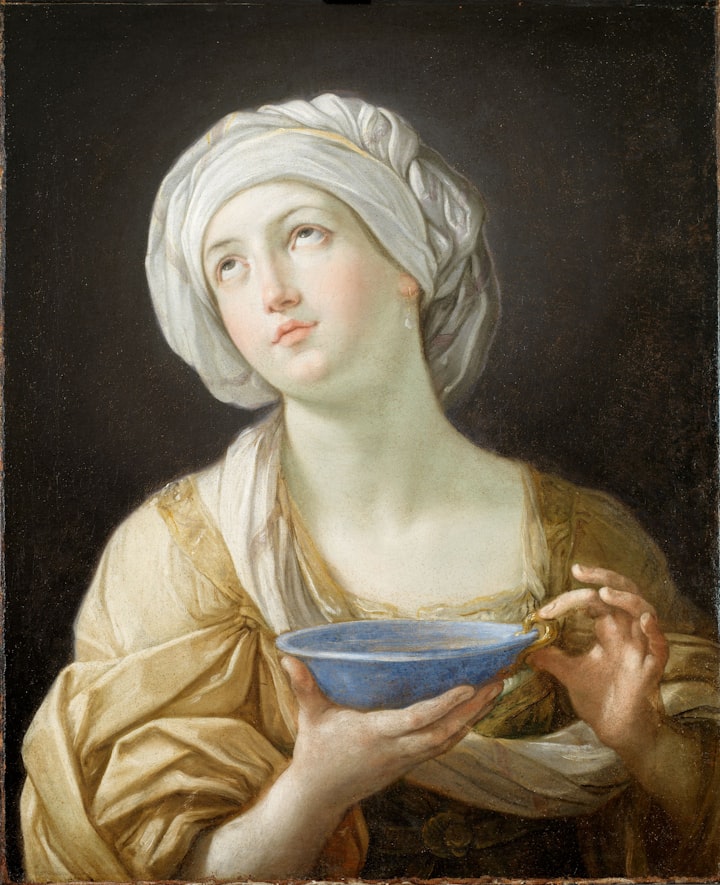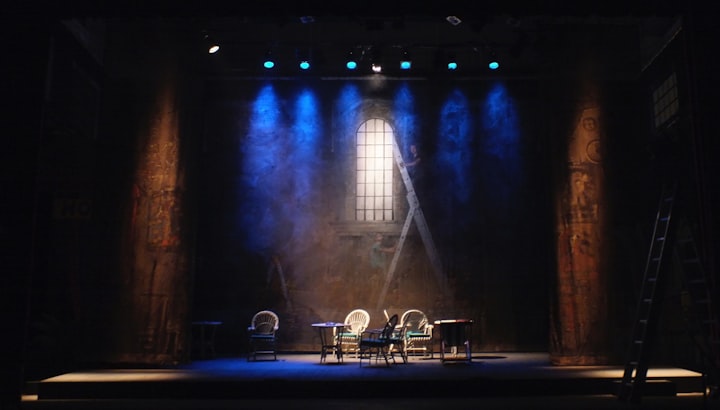Women
Not the Leading Role in Pre-Classical Literature through the Renaissance

When seen as an object, females are not given large roles. Although in modern times equal rights between genders has been making progress, and women's roles in literature and mass media are changing, it’s hard to ignore that the classics people learn from still hold blatantly sexist themes and messages. Women played a role in pre-classical, classical, medieval, and renaissance literature. The roles women played though, were oftentimes unflattering, objectifying, and demeaning. Oftentimes they were made out to be the cause of pain and suffering, or were considered prizes to be won, earned, and kept. Although women were seen in higher regard come the medieval and renaissance eras, they were still objectified and used to further the plot for their male counterpart rather than playing an actual role in the story.
In pre-classical and classical literature such as ‘Gilgamesh’, ‘Odyssey’, ‘Iliad’ and the ‘Aeneid’, women are considered to be earthly prizes and possessions. In ‘Gilgamesh’, it takes a woman being given like a prize, or possession, to a man, for the man to behave like a human. Her body is used in order to tame the man without her consent even being given. The men in the story are told to “find Gilgamesh… ask him to give you a harlot… return with her and let her woman’s power overpower this man.” (Davis, 50). They speak of her like she is an object, rather than a human being, saying that she is something for a man to give, rather than being her own person. In ‘Odyssey’, Odysseus cheats on his wife by being with the goodness Kalypso while his wife, Penelope, is expected to, and written as, staying home and being faithful to her husband all the years of his absence. Women are viewed as possessions, therefore it’s not seen as a problem that Odysseus and Kalypso “revel and rest softly side by side,” (Davis 251) so long as Penelope stays faithful to an unfaithful man, and sits on the shelf waiting for him to come home. In the ‘Aeneid’ and ‘Iliad’, Helen is given as a prize to Paris, the judge of a beauty contest between goddesses. Also, in ‘Iliad’, women are given as war prizes, and Achilles is upset when the father of one of the women he took comes and tries to get his daughter back. Achilles doesn’t use her name, but rather refers to her as his ‘prize’ as he says, “You forget this, and threaten to rob me of the prize for which I have toiled,” (Homer, 3) showing not only his demeaning view that the woman is a prize, but an object as well that shouldn’t be taken from him. As feminist religious writer, Libby Anne strongly puts it, in speaking of herself as part of women as a whole, “We aren’t objects. We aren’t things. Men shouldn’t be competing with each other to ‘win’ us. Women are people. Men are people.” This is a message often forgotten in pre-classical and classical literature.
The ‘Aeneid’ and ‘Iliad’ also exposes that in many tales, if the woman wasn’t just a prize or possession, she was the bringer or cause of destruction and unhappiness. The Trojan War was said to be because the goddesses who didn’t win the beauty contest, Athena and Hera, were angry that they had lost and were taking revenge against Paris, the judge of the contest, and his people, the Trojans. Speaking of the goddesses, Virgil writes in the ‘Aeneid’, “she recalled the anger and pain… deep in her heart lay stored the judgment of Paris, the insult to her beauty.” (Davis, 810) Because Helen was treated like an object, given to the Trojan Paris without her say, and forced to stay in Troy, and because women were upset they had lost, the ‘Aeneid’ said there was the Trojan War; because of women. Scholar Mark Cartwright writes that in this time period and other “Ancient cultures such as the Greeks who had formed a creation myth where woman was a creature secondary to man, and more specifically, in the form of Pandora, a bringer of unhappiness and vices” women are seen as objects and problems, and never in good light.
This thought process lasted into the medieval and renaissance eras with the rise of Christianity, as more and more people began to hear the story of the garden of Eden, and how Eve ate the fruit first, causing original sin. Because of Eve’s sin, in a Christian society, “women were simultaneously considered the source of all the ills of the world and the means of that world's redemption through the birth of Jesus Christ.” writes historian Joshua J. Mark. However, the Christian creation story wasn’t the only creation story to paint women as the antagonist. In the pre-classical literature era, the ‘Epic of Creation’ refers to women as, “holding falsehood, lies,” (Davis, 148) and as being evil sorceresses who “recited the incantation and kept casting [their] spell.” (Davis, 149). In the classical era, with Ovid’s ‘Metamorphoses’ creation story, the blame of evil men is placed on the feminised metaphor of Mother Earth, continuing this blaming of women for sin. Ovid writes, “Mother Earth,/Made pregnant by that blood, brought forth new bodies,/… the forms of men. And this new stock was also/Contemptuous of gods, and murder-hungry” (Davis, 172). No matter the era, women are seen as the creation of evil. Thankfully, the same thing can’t be said of women being handed out like prizes at a fair.
Come the medieval and renaissance eras, prizes were considered to be what you receive after you die, meaning women in the stories are no longer objectived prizes. A woman's symbolic roles in stories evolved to suit man's spiritual needs. St. Augustine is about repressed physical wants, and a mother helping to pull her son up in a spiritual sense. She helps confirm his spirituality. “She saw that through me [Saint Augustine] you had given her far more than she had long begged for by her piteous tears and groans.” (Davis, 1051-1052) Shakespeare in his sonnets says he runs no risk of the prize of a woman in the physical sense, because the woman he's attracted to and drawn to, the dark woman, is a woman whom he is not physically attracted to. Of her he writes, “Than in the breath that from my mistress reeks./ I love to hear her speak, yet well I know/ That music hath a far more pleasing sound” (Davis, 1447) In the Divine Comedy, Dante reaches spiritual height with Beatrice coming to raise him up. This is a re-materialization of the earthy female image, as he still sees her as beautiful, but it is no longer a physical longing, rather a spiritual one. Beatrice is only there to guide Dante to the heavens. Her entire role is getting Dante to heaven from the very first moment when Virgil “was sent by Beatrice, Dante’s beloved on Earth, who was concerned about his salvation.” (Davis, 1465). Virgil speaks of Beatrice, saying, “A lady’s voice… called me where I dwelled in Limbo.” (Davis, 1467) Beatrice is not given any characterization outside of being Dante’s spiritual manager. In the Canzoniere, Petrarch speaks of an unreturned love for Laura. He doesn’t see Laura as a prize, but her beauty is something he longs for and something that brings him to spiritual enlightenment. Laura is pined for, but she herself doesn’t do anything plot altering. Petrarch simply speaks of her, saying, “when she spoke, I divined the angels talking,” (Davis, 1442), though we hear nothing that she actually says. We just get the man’s interpretation of his feelings for her, and we don’t get to see her as a real person. Similarly, in Shakespeare's sonnets, women are spoken of, but aren’t active characters. This makes these stories that claim to be more enlightened no better than earlier tales.
In ‘Gilgamesh’, the women were either whores to tame the wild men, or dream interpreters. In ‘Odyssey’, women are prizes or weak and defenseless as is the case with Odysseus's wife Penelope who wasn’t able to rid her own home of suitors. In the ‘Aeneid’ and ‘Iliad’, women are prizes, trophies, and the causes of wars that we then see men heroically fight in, female warriors omitted from the story completely. Despite women being present in older works, the sexist hierarchy is blatantly obvious in all the works explored. Even as women stopped being prizes to be claimed, as we move into the medieval and renaissance eras, the change in men’s attitudes to women being spiritual guides and things to be admired does not allow them to have the character-ship of someone who could control their own fate, let alone steer the story or alter other people’s stories as seen in the Divine Comedy, Canzoniere, and Shakespeare's Sonnets. Although women are seen in higher regard come the medieval and renaissance eras, they are still objectified and used to further the plot for their male counterpart rather than playing an actual role in the story.

Works Cited
Anne, Libby. “No, Women Aren't Prizes to Be Won, but They Are People.” Love, Joy, Feminism, Patheos Explore the World's Faith through Different Perspectives on Religion and Spirituality! Patheos Has the Views of the Prevalent Religions and Spiritualities of the World., 11 June 2019, https://www.patheos.com/blogs/lovejoyfeminism/2019/06/no-women-arent-prizes-to-be-won-but-they-are-people.html.
Cartwright, Mark. “The Role of Women in the Roman World.” World History Encyclopedia, World History Encyclopedia, 2n.d., https://www.worldhistory.org/article/659/the-role-of-women-in-the-roman-world/.
Davis, Paul B. The Bedford Anthology of World Literature. Bedford/St. Martin's, 2009.
Homer. “Homer's Iliad Books 1-2 - University of Richmond.” Translated by Samuel Butler, Homer's Iliad Books 1-2, https://facultystaff.richmond.edu/~wstevens/FYStexts/iliad1-2.pdf.
Mark, Joshua J. “Women in the Middle Ages.” World History Encyclopedia, World History Encyclopedia, 2n.d., https://www.worldhistory.org/article/1345/women-in-the-middle-ages/.






Comments
There are no comments for this story
Be the first to respond and start the conversation.